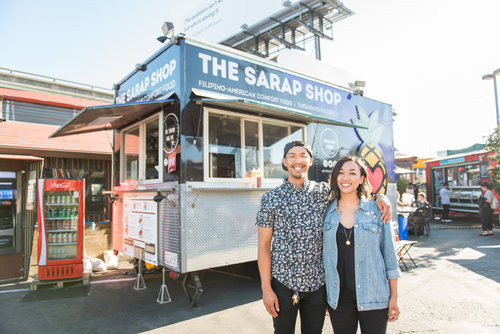The Sarap Shop
Sarap Shop’s Filipino-American Dream
“I got yelled at, I didn't know any lingo, and they put me in charge of one of the dishes for brunch! It was like a frito mixto, so it was like tempura-fried vegetables. I was like, ‘Oh man, what am I doing here!’”
Kristen Brillantes gives a hearty smile as her partner JP Reyes recounts his door-to-door search for his first job as a cook just five years ago, something he pursued after a realization common among young Americans took hold in their relationship: both he and Kristen wanted out of their day jobs.
“I was working at Google, and he was at One Medical, and we would take BART together from Daly City and get off at Embarcadero every day, and every day we would both be like, "I hate my job!" Eventually, we had a discussion, and I didn't think he was really going to quit his job, but then he did that day. And he knocked on different restaurant doors in Jackson Square, and he was just asking like, 'Can I work here for the day?' And then he ended up working that first shift at Cotogna, and made a ton of mistakes!” Kristen says.
The intensity of the experience only fueled JP’s curiosity about the restaurant industry, and together, he and Kristen quickly began exploring how to use food to pivot away from their traditional jobs and toward a project closer to the heart.
“After the first gig, they said, ‘Just read up in some books, you don't really have to go to culinary school, it's not worth the money, getting out of school and having all that debt, the best way to learn is to be hands on, learning in the kitchen.’ And I would watch my mom cook every now and then, but mainly Kristen's mom was the one I got close with, and we started cooking together and I was learning from her.”
It was a learning process that Kristen quickly joined in on, something she says is not just a direct outgrowth of her professional education outside of food, but also a reflection of her and JP’s shared values of relationship-building and community.
“I got interested in cooking mostly because I was like, "Why are [my mom and JP], the two people I want to spend time with, always hanging out without me?" They wouldn't let me in the kitchen! I was like, "Teach me!" I have always been involved professionally in team development and organizational behavior. So it's like, how can we actually be supportive partners to one another, where our relationship isn't just romantic? We should be in a position where we know what each other's individual goals are, and support that. We just wanted to build a business where you are spending all of these hours working, you might as well spend it with people you want to be spending time with anyways," Kristen says.
Kristen cites this familial, communal energy as a key aspect of the Sarap Shop project, and reflection of the decidedly Filipino values built into its menu of fiesta favorites, including adobo, reflection of the decidedly Filipino values built into its menu of fiesta favorites, including adobo, tofu sisig, and a vegetarian laing (taro leaves stewed in coconut milk).
“They say what makes Filipino food is that it's always cooked form the heart, and that's why it's so different from house to house to house. So when we were making our menu, we were cooking all stuff that are the favorite things that people in our lives like to eat. Like the tofu sisig, my brother's girlfriend is vegetarian, and sometimes there isn’t something for everyone on [Filipino menus]. And that's not the vibe I've ever felt growing up in a Filipino home, like, everyone should feel loved and feel welcome through the food. So I guess we have signature dishes, but I think the loving intention is what we try to portray as our signature thing: that our menu is inclusive so everyone feels like you were meant to eat here with us,” Kristen says.
At the same time, she says that Sarap Shop’s roots in traditional Filipino values are far from stagnant, and that the project’s emphasis is on a progression that seeks to further refine what it means to be Filipino-American, in and out of the kitchen.
“I am excited about UNDSCVRD because it is so Filipino to do. It's not just food, we are doing all the things, and it's like, you know when you have Filipino holiday parties, or like family parties, and everybody is doing their talent? So that's hella what it feels like to me. Like, 'Yo this is just a big family party and everybody is doing the talent show part,' but nobody's parents are forcing them to do it. We are just doing it!”
“Being American, it's like a salad bowl. Everything should retain its own identity and character, but when you put it together, it elevates everything, so we try to keep that in perspective. [You take] all the stuff your parents taught us, and evolve from that, and I think that's a link to the American values. There is a new generation of [Filipino-Americans] interested in conscious living, and community, and people not wanting to live by themselves anymore -- there is a communal aspect to living and business that feels less stressful, and I feel like events like this can demonstrate to older generations and to future generations that there is modeled behavior that you can keep showing, that you don’t have to do it alone. That you can share resources, and everyone can succeed, and there is enough success to go around,” Kristen says.
It’s a uniquely Filipino-American philosophy that she feels is reflected in the UNDSCVRD Night Market, where visitors can sample Sarap Shop’s famous tofu sisig and adobo, as well as pick up bottles of their house-made spicy condiment, Manila Sauce.




